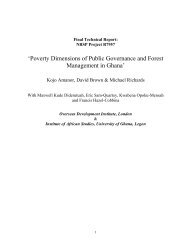The Gambian Tourist Value Chain and Prospects for Pro-Poor Tourism
The Gambian Tourist Value Chain and Prospects for Pro-Poor Tourism
The Gambian Tourist Value Chain and Prospects for Pro-Poor Tourism
You also want an ePaper? Increase the reach of your titles
YUMPU automatically turns print PDFs into web optimized ePapers that Google loves.
<strong>Tourism</strong> in <strong>The</strong> Gambia: International ‘Best Practice’ in Poverty Reduction & <strong>Pro</strong>-<strong>Poor</strong> Growth Through <strong>Tourism</strong><br />
Draft Report (Friday 22 nd December 2006)<br />
What this analysis excludes, however, is tourist tipping of hotel staff – which managers<br />
estimated at up to 100% of the wage <strong>for</strong> front-of-house staff. This represents another<br />
example of the impact of discretionary tourist spending impacting directly on poor people.<br />
Generous tipping may also explain why non-managerial hotel staff still work <strong>for</strong> rates that<br />
are about half the rate in the in<strong>for</strong>mal sector – which is an unusual pattern.<br />
To put these employment figures into context, in 1998 there were 37,460 <strong>for</strong>mal sector<br />
jobs in <strong>The</strong> <strong>Gambian</strong> labour market – 15,429 in the public sector <strong>and</strong> 22,032 in the private<br />
sector 27 . This suggests that people working directly in tourism constitute almost one-fifth of<br />
the private sector <strong>for</strong>mal sector jobs in the Country <strong>and</strong> hotel workers alone constitute over<br />
12% of private sector employment.<br />
<strong>The</strong>re are four key ways in which the linkage between the tourist accommodation sector<br />
<strong>and</strong> the poor could be increased: increasing the tax take from the accommodation sector;<br />
reducing seasonality of tourist dem<strong>and</strong>; increasing wages <strong>for</strong> workers; <strong>and</strong> the<br />
‘<strong>Gambian</strong>isation’ of hotel management.<br />
First, there is evidence of rather lax tax morality in the tourist accommodation sector in<br />
<strong>The</strong> Gambia. Our hotel survey estimates a gross annual surplus of about £10.8m (D600m)<br />
being generated by hotels which should be generating an annual tax take <strong>for</strong> government of<br />
about £3.7m or D210m – on the basis of the Income Tax Act stipulation of corporate tax<br />
levied at 35% of profit. With a strongly redistributive Budget, these funds could have an<br />
important impact on poverty in <strong>The</strong> Gambia. In reality, however, the Master Plan estimates<br />
the annual tax take from the tourist sector is only about £0.8m (D50m) – which implies tax<br />
morality of only about 24%.<br />
Box 2: <strong>Pro</strong>-<strong>Poor</strong> <strong>Tourism</strong> Regulatory Issue # 1<br />
An important role of the state is to redistribute resources from profitable enterprise to the<br />
poor. <strong>The</strong>re is evidence that the Income Tax Act is only generating about one-quarter of the<br />
total potential tax take. An important mechanism by which resources should be being<br />
transferred from the tourist sector to the poor is currently operating ineffectively <strong>and</strong> tax<br />
morality should be improved.<br />
Improving tax morality is a difficult <strong>and</strong> long-term aim – it has, <strong>for</strong> instance, taken the<br />
democratic government in South Africa a decade to raise tax morality from an estimated<br />
35% to 70%. It also needs to be achieved with a mixture of ‘carrots’ (e.g. amnesties on<br />
unpaid tax which is declared <strong>and</strong> reducing tax rates as payment rates increase) <strong>and</strong> ‘sticks’<br />
(more effective en<strong>for</strong>cement of tax legislation).<br />
<strong>The</strong>re is also a need to demonstrate to hoteliers some link between taxes paid <strong>and</strong> benefits<br />
received. A good illustration of bad practice in this respect is currently observed with<br />
municipal taxes in the <strong>Tourism</strong> Development Area (TDA). On the one h<strong>and</strong>, municipal taxes<br />
are being levied on hotels <strong>and</strong> on the other municipalities are failing to per<strong>for</strong>m even the<br />
most basic service delivery – such as solid waste disposal. This non-delivery has become so<br />
serious that the GTA is sometimes compelled to deliver services itself.<br />
Box 3: <strong>Pro</strong>-<strong>Poor</strong> <strong>Tourism</strong> Regulatory Issue # 2<br />
Tax morality is unlikely to increase if the tourist sector is perceived as a ‘cash cow’ from<br />
which resources can be extracted without any return. Hotel managers in the TDA are<br />
currently being presented with local government tax bills with very low <strong>and</strong> sporadic levels of<br />
basic municipal service delivery. <strong>The</strong> delivery of services to support the tourism sector should<br />
be an important priority <strong>and</strong> a delivery mechanism streamlined.<br />
27 EMG (2005) Gambia <strong>Tourism</strong> Development Master Plan Technical Report No.1 <strong>The</strong> Economic Impact of<br />
<strong>Tourism</strong><br />
34

















